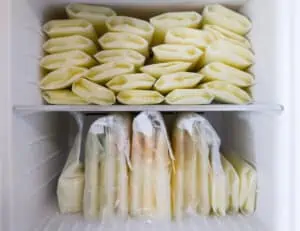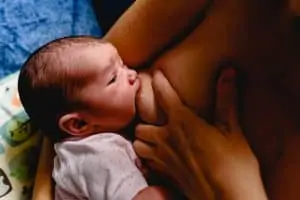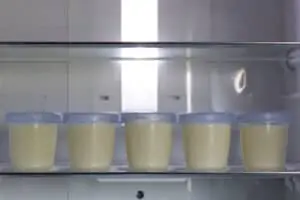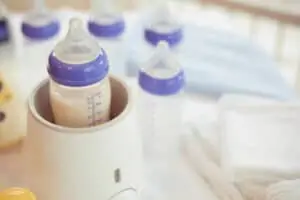With my eldest, I spent a lot of time simply nursing her. But there were times I was engorged and pumped milk to store. My husband and I spent a great deal of time working with his parents so that they understood how to keep breast milk from spoiling.
I always feared that my baby drank old breast milk. We’ll discuss the appearance of spoiled breast milk and the symptoms of contaminated breast milk.
You’re probably wondering what to do if your baby drinks spoiled breast milk. As I always say, don’t panic! Knowing what to look for and what to do will help you keep a keen eye out until your breastfeeding days have weaned.
Let’s get down to it!
Can breast milk spoil?
In a word, yes. Breast milk can certainly spoil. But does breast milk spoil inside the breast? Nope. That’s impossible. It cannot spoil while it’s still in your body. So, if you’re just feeding your baby from your breasts and never storing it anywhere else, your baby cannot drink spoiled breast milk.
However, I realize that’s a tall order to fill. Even if you don’t work and stay at home with your kids, surely there are moments when you NEED to fill your own cup. Perhaps you finally got the all-clear to work out again and want to get back to size.
Maybe you just need a glass of wine (or a whole freaking bottle) with your bestie and don’t want constant interruptions from the baby or your older children.
Relevant: Here’s how to pump your breastmilk at work!
In those moments, you’ll need to have pumped out breast milk for your spouse or a caretaker to give your baby. For that pumped milk, you MUST use proper storage techniques, or it will spoil.
What happens if my baby drinks spoiled milk?
Well, your baby will likely get sick from drinking old breast milk. That’s not likely to happen if you take the proper steps to handle and store it properly.
If you feed spoiled breast milk to your baby, they will throw it up. That should be the end of it once they puke it all up, though if the vomiting continues, you’ll want to call your pediatrician.
While most babies will be fine should this occur, you’ll want to avoid it if you can. That’s why you should know what to look for when it comes to breast milk. And that, my fellow mamas, is what can be challenging since breast milk has many different appearances. Let’s discuss it!
How to tell if breast milk has gone bad?
First, let’s discuss how breast milk SHOULD look. It can be yellow, off-white, a little orange, or even have a blueish hue. And! It can even vary in color during the same pumping session.
This is due to the foremilk and hindmilk ratio.
Foremilk is thinner and more watery, while hindmilk is thicker, richer, and fattier. This can fluctuate from the early morning hours to the late evening hours.
And then, there are things like your diet, herbs you may eat, how much hydration you get (hopefully enough!), and any medication you may be prescribed. So, there are many normal ways breast milk can appear. The scent is tricky, too, since breast milk can have a different smell depending on what you eat.
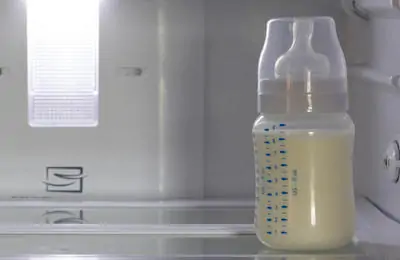
According to La Leche League, there are some guidelines to follow, which you can see in the handy chart below:
| Fresh for | Usable for | |
| Breast milk at room temp (68–72°F) | 4 hours | 6 hours |
| Refrigerated breast milk | 72 hours | 8 days |
| Frozen breast milk | 6 months | 12 hours |
Ah, but you’re tired. I totally get it. So space and time have no meaning anymore. And what if your spouse or a caretaker left it out? Has it been on the counter for 5 minutes or 5 hours?!?
So, let’s take a closer look at what to look for.
Separation
Separation of breast milk is normal after pumping. The fat rises to the top while the more liquidy part goes to the bottom. However, if it’s still good and unspoiled, it will easily mix if you gently swirl the bottle. If chunks float or it stays separated even after mixing, that’s a sign to toss that milk as it’s gone bad.
Smell
There are differences in smell in breast milk that don’t mean it’s gone bad. However, if it smells awful or sour, that’s a good indicator that it’s probably not wise to feed it to your baby.
But that’s not always helpful with frozen breast milk. When you freeze it and thaw it, the lipase, an enzyme that breaks down fats for your baby, can make it smell sour even when it’s still good.
A better option is to scald the milk before freezing. You can do this by heating your expressed milk on the stove in a small pan. When small bubbles form around the perimeter, please remove them from heat and let them cool. Then you can put it in proper storage bags or containers and freeze it. Problem solved!
Beware of reheating breast milk multiple times, though!
Taste it
I always think of the movie Look Who’s Talking with John Travolta and Kirstie Alley. There’s a part where he takes the baby’s bottle, not knowing it’s breast milk, and pours it into his coffee.
I know it seems weird to drink your milk, but you’re not exactly pouring a glass of the stuff and adding Hershey’s syrup, are you? Please don’t.
Anyway, take a small taste; as long as it’s not sour, it is fine. If it tastes like it is rancid or has a sour taste, throw it out. And don’t worry. That small sip, even if it is terrible, isn’t going to harm you. You’d need to drink a lot of it for that to happen, and if you did, you’d just throw up like you would with food poisoning.
How would I know if my baby drank bad breast milk?
Well, if you’ve been feeding your baby yourself and checking the milk, the baby will likely be fine. But what about hubby and caretakers?
That’s why it’s so important to make sure EVERYONE that helps you with your baby understands what to look for with expired breast milk. When you’re all on the same page, you’ll avoid this problem.
Uh oh…did you not talk? Well, you’re about to! In the meantime, these things might indicate that your baby drank bad breast milk…
- Baby’s not gaining weight or length
Your baby should be gaining about 5 to 7 ounces every week from birth to 6 months of age. By about 5 months, they should be about double their birth weight. So if this isn’t happening, breast milk is likely bad. Your baby should be growing in length as well, and if this isn’t happening, it’s vital to make an appointment with your doctor to determine the cause.
- Often agitated
Grouchy babies may be trying to tell you something. If your baby seems unhappy all the time, they’re likely not getting nutrients from the breast milk you’re giving them. You’ll notice this if you feed on the breast and all is fine and then have someone else feed the baby by the bottle, and the grouchiness starts up again.
- Check diapers for clues

Babies make lots of dirty diapers. To know your baby is getting enough from your milk, you’ll want to change them 5 to 10 times daily. That’s for poop and pee, incidentally. The baby is fine if all seems to be coming out alright. If there aren’t enough soiled diapers, the problem may be with your breast milk.
Is the baby’s urine dark?
That’s another clue they’re not getting what they need from your expressed breast milk. As for poop, it should look yellowish and be mushy from breastmilk. If it turns bright green and looks frothy, the milk your baby is getting is likely expired and lacks nutrients that fresh breast milk would provide.
- Milestone delays
While milestones aren’t set in stone since there’s a wide range of normal, breast milk deficiencies may be to blame if they are all delayed. Check with your pediatrician to rule out any other causes, though.
- Lethargy
Newborn babies tend to sleep A LOT. That’s about 17 to 18 hours daily, usually in 3 to 4-hour stretches. But when babies are lethargic every minute of the day, you may want to check any stored breast milk anyone is feeding your child.
- Check for swelling
If breast milk has gone bad, it may cause your baby’s face to swell. This can also happen around the stomach. Swelling will indicate a reaction of some kind, so it’s essential to have your baby checked out.
Breast milk problems aside, anything that seems off with your baby should be checked out. The keys here are whether or not your child is acting normally and growing in weight and size.
What happens if you leave breast milk out overnight?
Haha, I remember doing this when we lived in China. I was storing breast milk for my in-laws to use to feed my youngest, and I left it out on the counter all night. In my husband’s culture, waste is frowned upon, but my husband knew this could be dangerous for our daughter, so he threw it out.
We were thankful his mom hadn’t arrived yet because she would have surely used it and made our girl sick.
Breast milk won’t just spoil right away, though. You can certainly leave it out for a little while before it goes bad. If you’ve just pumped, you can keep it at room temperature, which is about 77F (25°C), for anywhere from 5 to 8 hours and still uses it safely. I’d tend to stay closer to that 5 hours, though.
Again, you can always look, smell, and taste it before serving it to your baby.
If you’ve refrigerated said breast milk and let it sit at room temperature, you can keep it there for up to 4 hours. Frozen milk that has been thawed and warmed can also stay out for up to 4 hours.
But frozen breast milk that you thawed and then warmed can’t be left at room temperature because it will go bad immediately.
The important thing to remember here in your tired haze is this: if you have doubt, throw it out. Or, you can use expired breast milk for other purposes if you’re like my mother-in-law, who doesn’t like to waste things. While she went to the extreme (she’d keep rotting vegetables around), it is a good idea when you can safely reuse items.
Best usage of expired breast milk
So, what can you do with expired breast milk? There are a few cool things you may want to try!
- Pour it into the bath
Ever take a milk bath? It’s so good for the skin, so use the expired breast milk in a tub for yourself or bathe your baby in it. You’ll love how soft skin feels afterward, though to make it smell nice, I would add lavender essential oil to the tub when we had breast milk around the house.
Does the baby have sensitive skin or eczema? A soak with that old breast milk might be all she needs to help relieve this skin condition.
- Let it heal you
Because of the nutrients breast milk has, it’s excellent for healing. Maybe that’s why my skin always looked so lovely after that breast milk was soaked! In any event, you can use one of those ice cube trays to make cubes of it that you can apply to small cuts and scrapes. It works great for diaper rash too!
However, be careful when you do. My friend Ella did this and didn’t label them. She had been keeping it around because it relieved her sore nipples from breastfeeding. Her husband thought she’d frozen some coffee creamer. Needless to say, he looked a bit green around the gills afterward.
- Get crafty
If you have an artisanal side to you, try making homemade soap. Now, I can hold my own with crafting, but this is where my stop is on the train tracks. However, you’ll find soap-making kits to help you get into this craft.
And now that we’ve found ways to use old milk that can’t be consumed, let’s move on to storing your breast milk the right way so you don’t have to worry about it going bad!
How to store breast milk properly?
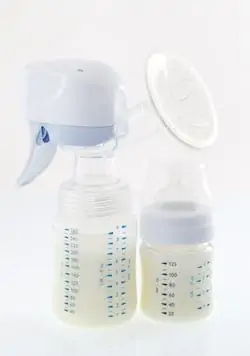
There is no ONE way to store breast milk. However, these tips will help you check all the boxes for safe storage. I must insist, though, that you double-check everything you do with breastmilk.
This is hard, I know because you feel like you haven’t even slept in a century. But it is far better than having your baby throw up everywhere and feel unwell.
Handle with care
It is NOT just the milk you need to be careful with. It’s everything that touches it too. You have to clean your pump well so it is easy to keep the milk free of contaminants. It’s a chore, sure, but you can sleep soundly (when you do sleep, that is) if you know your breast milk isn’t coming into contact with a dirty surface.
The same goes for your bottles, the nipples, and anything that milk touches.
Clean your hands
One thing I learned from COVID is that not everyone has the same hygienic practices that I uphold. Actually, I knew that beforehand, but I chose to block it out or else I’d gag. After you wash your hands, do not touch anything except the bottles you need for the breast milk.
We pick up our phones daily, day in and day out. My husband sits on the toilet with his phone. I’m sure yours does too. It’s a man thing. Think of the germs! Everything you touch has the potential to deposit germs onto what you need to feed the baby.
So, wash up, and always keep wipes and sanitizer with you in your diaper bag so that things stay clean and sterilized even when you’re not near a sink.
Use proper storage
Please make sure you use clean bottles and mark the date on them. The seal should be airtight. A heavy-duty freezer bag works too. You want to seal it without air. When stowing the bottles, swap the nipples off the tops so it stays closed and no air can get in there. This will keep it from going bad before it’s time to use it.
Put these storage guidelines on your fridge
Milk that has been insulated in your cooler bag from when you pumped it at the office must be used immediately, within 24 hours. Make that milk the first one anyone uses for you while at work to prevent spoilage. If you were at home and pumped and then properly contained your breast milk and put it in the fridge, it would be good for up to 5 days.
Also, keep it at the back of your fridge as this is the coolest part and will keep it at the proper temperature.
Freezing techniques
When you freeze your breast milk, which is a great way to make it last, you want to give about an inch or so from the top. Do NOT fill it all the way. Breast milk will expand when you freeze it.
Thaw properly
NEVER leave frozen breast milk out at room temperature for it to thaw. Please put it in the fridge to thaw it out first. While you can warm it on the stove when it is not frozen, doing so with frozen milk is a bad idea.
Final thoughts on expired breast milk…
Now you can breathe easily, knowing how to prevent spoilage with breast milk. If you’re always nursing, you have less to worry about. However, when your breasts become sore, and you need milk out NOW, you may want to reserve that milk for your husband or grandparents to feed the baby with.
These tips will help ensure you don’t let any good stuff go to waste; if it does, you’ll know to look, sniff, and taste to see if it’s safe.
Leslie Berry lives with her husband and two young daughters in Los Altos, California, where she loves helping other moms get comfortable with motherhood and embracing the insanity with facts peppered with laughs.
She loves eating too much sushi, exercising, and jamming out on her Fender. Read more about Leslie here.


